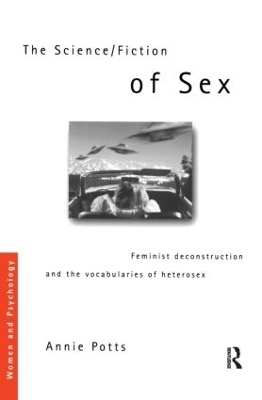
The Science/Fiction of Sex
Feminist Deconstruction and the Vocabularies of Heterosex
Seiten
2002
Routledge (Verlag)
978-0-415-25731-2 (ISBN)
Routledge (Verlag)
978-0-415-25731-2 (ISBN)
Contemporary feminist and poststructuralist theories of sex and gender are explored alongside an investigation of how people make sense of such concepts as heterosexuality, orgasm, sexual dysfunction and femininity and masculinity.
What can we learn from exploring the differences in male and female orgasmic experience? Is the penis an entity with a mind of its own? These issues and others, such as the popular portrayals of male sexuality as active and outwardly focused and female sexuality as passive and internally located, are discussed in The Science/Fiction of Sex. Contemporary feminist and poststructuralist theories of sex and gender are explored alongside an investigation of how people make sense of such concepts as heterosexuality, orgasm, sexual dysfunction, femininity and masculinity, and safer sex practice.
Potts asks men and women about their actual experiences of heterosex. This interview material, combined with excerpts from sexological and medical texts and features from film and television, draws attention to the ways in which western cultural constructs influence our ideas and experiences of the body, sex, and gender. Potts also uses deconstructive theory as a textual tool, concentrating on how binary oppositions such as inside/outside and mind/body impact on our understandings of heterosex, and affect the power relations between women and men. She also examines how the radical postmodern theories of the body and sexuality proposed by Irigaray, Lyotard, and Deleuze and Guattari disrupt such dualistic modes of understanding and experiencing sexualized bodies. The Science/Fiction of Sex will be of interest to those studying women and psychology as well as gender studies, cultural studies, feminist studies, sociology, philosophy, public health and education.
What can we learn from exploring the differences in male and female orgasmic experience? Is the penis an entity with a mind of its own? These issues and others, such as the popular portrayals of male sexuality as active and outwardly focused and female sexuality as passive and internally located, are discussed in The Science/Fiction of Sex. Contemporary feminist and poststructuralist theories of sex and gender are explored alongside an investigation of how people make sense of such concepts as heterosexuality, orgasm, sexual dysfunction, femininity and masculinity, and safer sex practice.
Potts asks men and women about their actual experiences of heterosex. This interview material, combined with excerpts from sexological and medical texts and features from film and television, draws attention to the ways in which western cultural constructs influence our ideas and experiences of the body, sex, and gender. Potts also uses deconstructive theory as a textual tool, concentrating on how binary oppositions such as inside/outside and mind/body impact on our understandings of heterosex, and affect the power relations between women and men. She also examines how the radical postmodern theories of the body and sexuality proposed by Irigaray, Lyotard, and Deleuze and Guattari disrupt such dualistic modes of understanding and experiencing sexualized bodies. The Science/Fiction of Sex will be of interest to those studying women and psychology as well as gender studies, cultural studies, feminist studies, sociology, philosophy, public health and education.
Annie Potts teaches critical sexuality studies in the Department of Gender Studies at the University of Canterbury, NZ. She also leads a national study, funded by the NZ Health Research Council on the social impact of sexuopharmaceuticals. Her previous publications include texts on critical psychology, gender and cultural studies and human/animal politics.
Introduction. Part One: The Science/Fiction of Sex. Sexual Science Fiction. War of the Worlds. Part Two: The Vocabularies of Heterosex. The Day the Earth Stood Still. The Man with Two Brains. The Incredible Shrinking Man. Innerspace. The Final Frontier. Brave New Worlds. Parting Comments, Future Sexes.
| Erscheint lt. Verlag | 27.11.2002 |
|---|---|
| Reihe/Serie | Women and Psychology |
| Verlagsort | London |
| Sprache | englisch |
| Maße | 156 x 234 mm |
| Gewicht | 476 g |
| Themenwelt | Geisteswissenschaften ► Psychologie ► Allgemeine Psychologie |
| Geisteswissenschaften ► Psychologie ► Sexualität / Partnerschaft | |
| Geisteswissenschaften ► Psychologie ► Sozialpsychologie | |
| Sozialwissenschaften ► Politik / Verwaltung ► Politische Theorie | |
| Sozialwissenschaften ► Soziologie ► Gender Studies | |
| Sozialwissenschaften ► Soziologie ► Spezielle Soziologien | |
| ISBN-10 | 0-415-25731-X / 041525731X |
| ISBN-13 | 978-0-415-25731-2 / 9780415257312 |
| Zustand | Neuware |
| Haben Sie eine Frage zum Produkt? |
Mehr entdecken
aus dem Bereich
aus dem Bereich
Buch | Softcover (2024)
Hogrefe Verlag
CHF 46,50
wie Affekte innere Entwicklung ermöglichen
Buch | Softcover (2023)
Klett-Cotta (Verlag)
CHF 41,95


